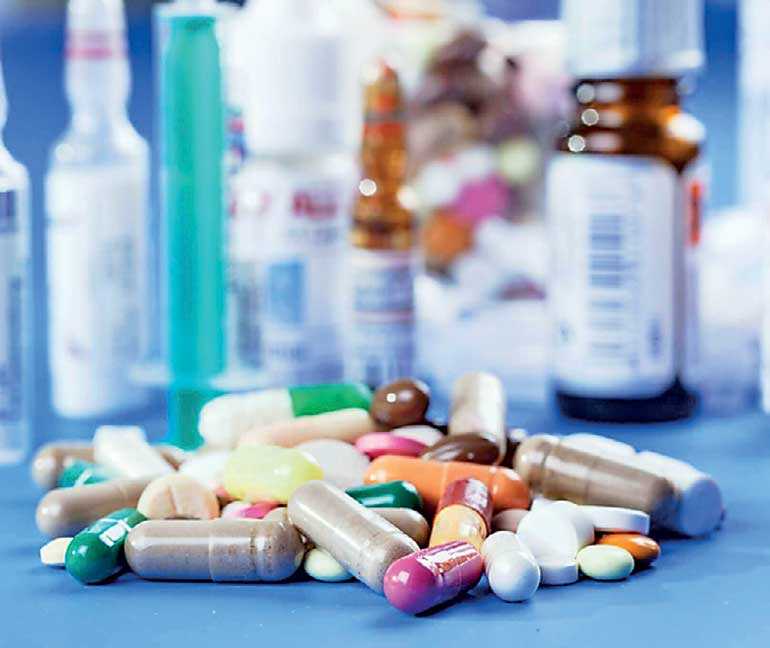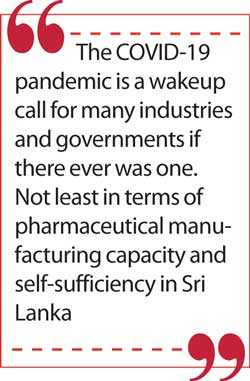Sunday Feb 22, 2026
Sunday Feb 22, 2026
Tuesday, 28 April 2020 00:00 - - {{hitsCtrl.values.hits}}

Sri Lanka imports over $ 500 million of pharmaceuticals annually and nearly half of this comes from India. Last month, India restricted the export of 26 pharmaceutical ingredients and the medicines made from them, including paracetamol, as the coronavirus outbreak plays havoc with their supply chains
The Sri Lankan health services have done a remarkable job in terms of managing the impact of the global pandemic thus far. Whilst the immediate threat continues to be managed, we must prepare ourselves for what comes next. The current pandemic has caused much upheaval across the world with probably more to come. As history has shown us, this too shall pass.
The COVID-19 pandemic is a wakeup call for many industries and governments if there ever was one. Not least in terms of pharmaceutical manufacturing capacity and self-sufficiency in Sri Lanka.
With global supply chains disrupted and the world staring down the barrel of a global recession, increased manufacture of pharmaceuticals locally would address not one but many challenges we are faced with. It would mean greater availability of much needed medication as well helping the Sri Lankan economy at the same time by reducing foreign exchange outflows, potential for export earnings and creating much needed jobs.
Sri Lanka imports over $ 500 million of pharmaceuticals annually and nearly half of this comes from India. Last month, India restricted the export of 26 pharmaceutical ingredients and the medicines made from them, including paracetamol, as the coronavirus outbreak plays havoc with their supply chains. There is no need to panic immediately as Sri Lanka has the capacity to manufacture most of the paracetamol consumed domestically. India has even gifted a 10-tonne consignment of pharmaceuticals to Sri Lanka during the current crisis. However, this does expose the need for Sri Lanka to achieve greater pharmaceutical security which may not have been taken too seriously thus far.
Efforts to reduce imports during the current crisis, whilst helping with managing foreign exchange outflows, have a negative impact on Government revenues through loss of import duties and taxes, and therefore restrict much needed Government spending on critical activities and stimulus. As there are no import duties levied on pharmaceuticals, increasing local manufacture will not impact Government revenue negatively unlike many other cases.
Local manufacture of pharmaceuticals has grown steadily since the introduction of the Buyback program in 2014. As a result, we have now achieved over 15% self-sufficiency. However, we need a more focused effort to ensure we accelerate much faster in order to reach a meaningful target and to compensate for the national economic impact of COVID-19. 
We could aim to triple the value of pharmaceutical manufacturing within 24 months, given the increased manufacturing capacity in the pipeline and with a focused effort to create new manufacturing capacity. In order to achieve this, manufacturing capacity would need to be created in new dosage forms including segregated manufacturing categories whilst enhancing the product range manufactured under the existing categories.
Given export markets are quite saturated in general categories, most medium-term export potential also lies in these segregated categories.
It would usually be possible to commission a new facility to produce validation batches of pharmaceuticals in as little as six months where appropriate buildings and utilities are already available, and in approximately 18 months on greenfield sites. Proposals have been shared with the Government on a coordinated effort to increase manufacturing capacity and product range within 2020 and beyond, that would lead to significant progress on the path to near self-sufficiency as well as desired economic and social impact. Private sector involvement would be needed to achieve these objectives within a short period, with new investors and corporates taking initiative.
(The writer is the Immediate Past President of the Sri Lanka Pharmaceutical Manufacturers Association and former Managing Director of one of Sri Lanka’s largest private pharmaceutical manufacturers.)